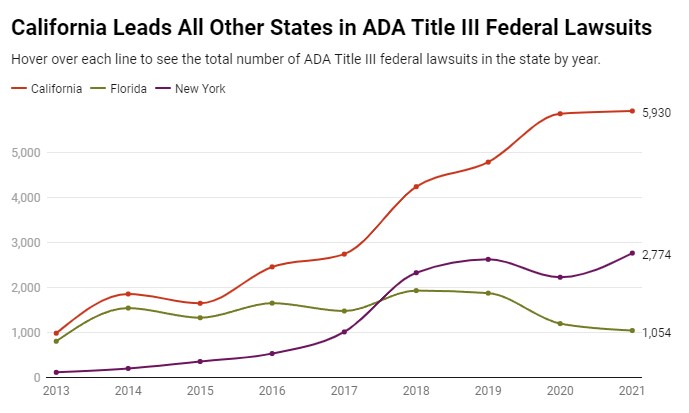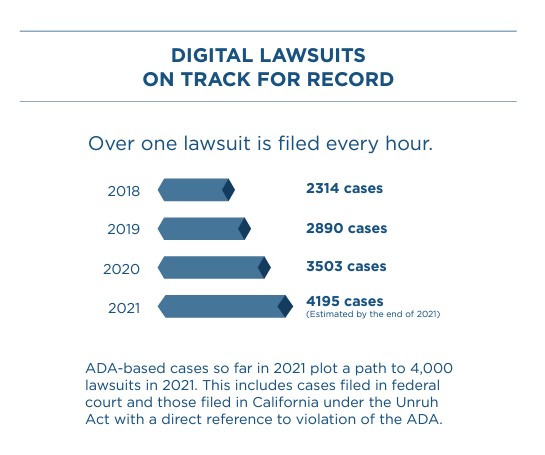
FRESNO, California – Cody Sarhan, Communications Specialist
California small businesses are being sued more than all other US states combined over their websites not being ADA compliant. Due to a combination of state tax laws and a general lack of business awareness, law firms are capitalizing on the opportunity to file lawsuits against companies whose websites lack certain web accessibilities.
Learn more: How Xobee can ensure your website stays ADA compliant
Any member of the public is well within their rights to use the accessibility legislation that exists as part of the ADA to argue that their needs are not being met by a company or public organization. Additionally, law firms are becoming increasingly efficient at targeting small businesses.
“There are thousands of lawsuits filed each year alleging websites and mobile applications are not coded so that they are accessible to individuals who are blind.” — Kristina Launey, Seyfarth Shaw litigator

Source: Seyfarth Shaw analysis, February 2022
Settlements range from $20,000 to $100,000 and average around $35,000. There were 265,000 demand letters sent out last year alone, with nearly 50% of lawsuits filed coming from just five different law firms.

Source: Report by UsableNet Inc
“Companies with revenue below $50 million were the targets of two-thirds of lawsuits between Jan. 1 and June 21, a shift from the year-earlier period, when the share was less than half” — Ann-Marie Alcántara, Wall Street Journal Reporter
What is Website ADA Compliance?
Web accessibility is a set of rules, behaviors, code standards and design guidelines that allow people with disabilities — which comprise 20% of the world’s population — to effectively use websites. To achieve this, the W3C (The World Wide Web Consortium) has created the “Web Content Accessibility Guidelines” 2.1 (WCAG 2.1), which are meant to explain and guide developers on how to make websites accessible.
These guidelines have been adopted by governments around the world and are now a part of various legislations, such as the ADA, Section 508, EN 301549, and others. Businesses with websites that are not WCAG compliant are at risk of costly web accessibility lawsuits. Read on to learn why and how.
Further reading: How to prevent a web accessibility lawsuit
Xobee Web Accessibility Compliance Protects You
In the physical world, there’s a clear framework set by time, experience, legislation, and precedent. But the internet is evolving at a rate that is difficult to keep up with for some companies. That’s where an MSP like Xobee can help. Through our experience, expertise, and specialized focus we can help protect your business so you can focus on your clients and customers.
Xobee’s web accessibility compliance service is the only solution that ensures full accessibility compliance at any given time, even on websites with daily updates.
Click here: Contact one of our highly-skilled team members to learn more
We can add our tool to most website platforms including WordPress, Wix, Joomla, Shopify, and more – even if we didn’t build it!
Xobee Networks now has engineers servicing clients within Fresno, Clovis, Madera, San Jose, Sacramento, San Francisco, Los Angeles, Santa Monica, Las Vegas, Bakersfield, San Diego, San Luis Obispo, Anaheim, and Palm Springs. If you wish to learn more about our services, contact a team member here.
Cody Sarhan | Communications Specialist, Xobee Networks
